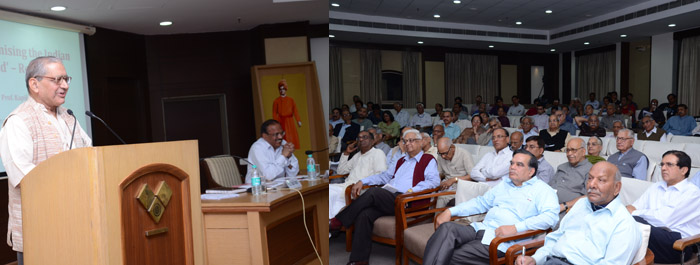On 16 March 2013, VIF welcomed Prof. Kapil Kapoor, former Pro-Vice Chancellor of Jawaharlal Nehru University and Editor in Chief of the Encyclopedia of Hinduism, as the guest speaker on its Vimarsha series of talks by eminent persons. Mr. Ajit Doval KC, Director VIF, stated that “Minds” will be the future tools of establishing control and therefore it is very important to understand how colonised the Indian mind today is. More daunting is the task of “Decolonising the Indian Mind” – precisely the subject on which Prof. Kapoor was going to deliberate upon during his talk.
Assessing the Indian Mind, Prof. Kapoor elaborated the likely effects of colonisation on our minds, a few of which are identity crisis, loss of ‘voice’, and submergence of vocabulary, and as a consequence we observe subjugation of minds which can be seen in our attitudes, decisions, self-appraisal and practices. Thus, because of colonisation we lost self-knowledge, traditions, cultures and values. However, this ‘loss of self-knowledge’ is usually accompanied with the process of ‘recovery’ and therefore the entire phenomenon is cyclical, known as Vyasa Parampara.

The British colonisation was different from the previous Greek and Islamic interventions. During the British period, we lost our sense of adversary, or what is called the shatru-bodha, and embraced the colonisers, presuming that they had come to liberate us. The British left behind an education system that still keeps us colonized even after 60 years of Independence. This educational system taught us human centrality, dissected God/Gods from Nature, asserted that the rest is there to serve human purpose, and that nature is not sacred. It established adversarial relations between Humans and Gods.
As a result, Prof. Kapoor argued, the Indian mind, especially the educated class, can observe conflicts in our values. Instead of practicing restraint or Sanyama, we practice indulgence; instead of a disciplined life or Niyama, we endorse freedom; instead of reverence or Shraddha, we believe in disposing off (whether objects, or relations); and instead of identifying and fulfilling our duties or Dharma, we fight for our rights.
In concluding his talk, Prof. Kapoor emphasized on the importance of our education system, stressing on how Macaulay and others had transformed our education to suit the British colonial interests, and argued that re-structuring our education system is the key to begin the process of decolonisation of the Indian mind. The session was concluded with a set of questions raised by an enthusiastic audience, clearly capturing how well the talk was received.








